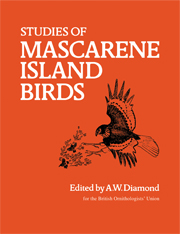Book contents
- Frontmatter
- Contents
- List of contributors
- Foreword
- Introduction
- I The native avifauna of the Mascarene Islands
- 1 An ecological history of the Mascarene Islands, with particular reference to extinctions and introductions of land vertebrates
- 2 The fossil record
- 3 Vocalisations of the endemic land-birds of the Mascarene Islands
- II The surviving native birds of Mauritius
- 4 The ecology of the smaller land-birds of Mauritius
- 5 The larger land-birds of Mauritius
- III The surviving native birds of Réunion and Rodrigues
- 6 The ecology of the surviving native land-birds of Réunion
- 7 Notes on the nesting of Procellariif ormes in Réunion
- 8 Observations on the surviving endemic birds of Rodrigues
- IV Measurements and weights
- 9 Measurements and weights of the surviving endemic birds of the Mascarenes and their eggs
- References
- Index
3 - Vocalisations of the endemic land-birds of the Mascarene Islands
Published online by Cambridge University Press: 04 August 2010
- Frontmatter
- Contents
- List of contributors
- Foreword
- Introduction
- I The native avifauna of the Mascarene Islands
- 1 An ecological history of the Mascarene Islands, with particular reference to extinctions and introductions of land vertebrates
- 2 The fossil record
- 3 Vocalisations of the endemic land-birds of the Mascarene Islands
- II The surviving native birds of Mauritius
- 4 The ecology of the smaller land-birds of Mauritius
- 5 The larger land-birds of Mauritius
- III The surviving native birds of Réunion and Rodrigues
- 6 The ecology of the surviving native land-birds of Réunion
- 7 Notes on the nesting of Procellariif ormes in Réunion
- 8 Observations on the surviving endemic birds of Rodrigues
- IV Measurements and weights
- 9 Measurements and weights of the surviving endemic birds of the Mascarenes and their eggs
- References
- Index
Summary
One of the aims of the BOU Mascarene Islands Expedition was to obtain as complete a record as possible of the voices of the endemic birds. To this end I spent the breeding seasons of 1973 and 1974 in the islands, and recorded all the endemic land-birds. This report is concerned solely with vocalisations and associated behaviour. Some comparisons are made, where appropriate, between the voices of Mascarene birds and related birds elsewhere.
Itinerary and methods
The dates of my visits to each island, and the study areas I used, are listed in Table 1.
In both seasons the breeding cyle of all species had begun, so I could not study the initial period when territories were being set up and pairs formed. For some species, the time spent in the islands was not long enough for me to be able to determine the behavioural context of all the calls recorded. The passerine species were easier than the non-passerines to observe and tape-record, so that results for them are more complete.
Weather conditions were better for recording in 1974 than in 1973, when frequent high winds and cyclonic disturbance gave rise to background noise. I spent an average of 11 hours per day in the field. On return each night, whenever possible, a primary edit was done, the edit books written up, and the tapes re-spooled onto 7-inch reels. ‘Playback’ tapes also were prepared to attract and stimulate certain species, especially Zosterops chloronothos, whose population density was so low in any given locality that playback proved very useful in helping to locate individuals and to hold them in an area for a short period.
- Type
- Chapter
- Information
- Studies of Mascarene Island Birds , pp. 101 - 150Publisher: Cambridge University PressPrint publication year: 1987
- 1
- Cited by



